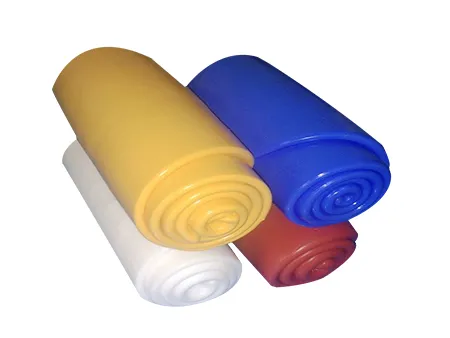What is the minimum order quantity (MOQ) for fluoroelastomer and rubber compounds?
For air shipments, the minimum order quantity is 20–25 kg. For sea shipments, the MOQ is 100 kg.
What is the delivery time for fluoroelastomer and rubber compounds?
If the product is in stock, orders are typically shipped within 3 business days. For non-stock items, the lead time is around 7–14 business days, depending on production schedules and order volume.
How are fluoroelastomer and rubber compounds packaged?
Most products are packed in PE film inside cartons, with a standard net weight of 20–25 kg per carton. For bulk shipments, palletized options of 500 kg are available. Some materials may also be packaged in drums or customized formats, depending on specific order requirements.
How do I choose the right grade of rubber compound?
Our team can assist in selecting the most suitable fluoroelastomer or rubber compound based on the application requirements, operating conditions, and performance expectations. Contact us for tailored recommendations.
What factors should I consider when selecting rubber compounds?
Two important factors to consider are the coefficient of friction and the coefficient of thermal expansion. The coefficient of friction determines how much force is required for movement between surfaces, which affects wear resistance and performance in dynamic applications. The coefficient of thermal expansion indicates how much a material expands or contracts with temperature changes, which is critical for maintaining dimensional stability in varying conditions. Selecting the right rubber compound requires a balance of these properties to ensure consistent performance and durability. We carefuly test and control these parameters to meet specific application needs.
How should rubber sheets be stored properly?
Rubber sheets should be stored following the BS ISO 2230 - 2002 guidelines, which outline best practices for inspection, packaging, and storage to maintain material quality. We follow these standards to ensure our products remain in optimal condition during storage and transportation.
What is fluoroelastomer (FKM)?
Fluoroelastomer (FKM) is a fluorinated synthetic rubber engineered for high-temperature and chemically demanding environments. Its molecular structure provides strong resistance to chemicals, oils, and extreme operating conditions, which makes it ideal for applications where durability and stability are essential. Depending on the grade, FKM can withstand continuous exposure to 204°C, with certain formulations offering short-term resistance up to 300°C. Its ability to maintain mechanical integrity and sealing performance under extreme conditions makes it a preferred material in automotive, aerospace, and industrial sealing applications.
Which fluoroelastomer (FKM) grade is best for my application?
Fluoroelastomers come in a variety of types and grades, each formulated for specific applications and performance requirements. Different brands and compositions offer varying levels of chemical resistance, temperature stability, and mechanical properties. Our technical team can help identify the most suitable FKM grade based on your operating conditions, environmental factors, and performance needs, ensuring the material meets your application’s requirements effectively.
Where are fluoroelastomer (FKM) seals commonly used?
Fluoroelastomer seals are widely used across industries due to their durability and resistance to extreme conditions. In the automotive sector, they are essential for sealing engines and transmissions, ensuring long-term performance under high temperatures and exposure to fuels. In chemical processing, FKM seals are used in corrosion-resistant equipment and pipelines, providing reliable sealing in harsh environments. Aerospace applications also benefit from fluoroelastomers for aircraft and spacecraft sealing, as they withstand extreme pressure and temperature changes. Additionally, in medical devices, such as syringes and infusion systems, these seals ensure consistent performance in sterile environments.
How do I choose the right fluoroelastomer O-ring?
Choosing the right fluoroelastomer O-ring involves considering factors such as the operating environment, including temperature, pressure, and chemical exposure. Proper dimensional requirements are also critical to ensure a secure fit with the equipment. Additionally, selecting a formulation that meets industry-specific performance standards ensures durability and reliability in challenging applications.
What are the key maintenance tips for fluoroelastomer seals?
To ensure long-term performance, fluoroelastomer seals require regular maintenance. Routine inspections help identify signs of wear, aging, or deformation, preventing potential leaks or failures. Keeping the seals clean is equally important, as accumulated dirt and contaminants can compromise their sealing efficiency. Additionally, monitoring operating conditions such as temperature and chemical exposure ensures that the seals function within their recommended limits, preserving their durability and reliability.
How should fluoroelastomer O-rings be stored?
Proper storage is important to maintain the integrity and performance of fluoroelastomer O-rings. They should be kept in a cool, dry place, away from direct sunlight, to prevent material degradation. Exposure to chemicals such as oils and solvents should be avoided, as these substances can affect the rubber’s properties over time. Keeping O-rings in their original packaging helps prevent deformation and contamination, ensuring they remain in optimal condition until they are ready for use.
Where is perfluoroelastomer (FFKM) used?
Perfluoroelastomers are highly valued for their exceptional chemical resistance, withstanding exposure to over 1,600 different chemicals. They are commonly used in applications where standard fluoroelastomers are not sufficient, such as in environments with rocket fuel, strong oxidizers, nitric acid vapors, and other aggressive chemicals. Due to these properties, FFKM seals are widely used in industries such as semiconductor manufacturing, aerospace, chemical processing plants, crude oil refining, and nuclear energy, where extreme conditions demand high level of sealing performance.
Do you offer custom formulations?
Yes, we provide customized fluoroelastomer formulations tailored to meet specific operating conditions and industry requirements. Our team can adjust the rubber material composition to optimize resistance to temperature, chemicals, and mechanical stress. In addition to material customization, we offer technical consultation and training, helping customers better understand and utilize fluoroelastomers to improve production efficiency and overall product quality.





